|
Do you need durable medical equipment and devices (DME) for your health condition, disability, or injury? If so, you may be facing some challenges, such as high costs, limited availability, insurance issues, and lack of convenience. But what if we told you that there is a better way to get the DME you need, without breaking the bank, wasting time, or compromising quality?
We are excited to announce a new partnership between My Virtual Physician and Your Medical Store, two online platforms that provide telemedicine and medical equipment services. This partnership allows you to use My Virtual Physician to get online consultations, prescriptions, ordering, and billing for DME, and use Your Medical Store to get the products delivered to your doorsteps, with your insurance covering the costs. Sounds too good to be true? Well, it’s not. It’s real, and it’s here to help you.
In this blog post, we will explain what DME is, why it is important, what are the challenges of getting it, how the partnership between My Virtual Physician and Your Medical Store works, and what are the advantages of using them as your “go-to” providers. By the end of this post, you will have a clear idea of how you can get the DME you need, with ease, efficiency, and satisfaction.
DME is a term that refers to items needed to function at home with a medical condition, disability, or injury. Some examples of DME are:
DME is important for many patients, as it can improve their quality of life, reduce complications, and prevent hospitalizations. For instance, patient lifts and slings can help a caregiver safely move their loved one or patient from bed to chair or chair to bath time, oxygen equipment can help patients with respiratory conditions breathe better, and wheelchairs can help patients with mobility issues move around. DME can also help patients recover from surgeries, injuries, or illnesses, and maintain their independence and dignity.
DME has been shown to have positive effects on health outcomes, such as reducing mortality, morbidity, and readmissions, and increasing adherence, satisfaction, and quality of life.
Despite the benefits of DME, many patients face difficulties when they need it. Some of the common challenges are:
These challenges are not uncommon and have been reported by many patients and studies. For instance, a recent survey found that 40% of Medicare beneficiaries who used DME experienced problems with access, cost, or quality, and another report found that 20% of Medicare beneficiaries who used oxygen equipment had difficulties with delivery, service, or repairs.
Fortunately, there is a solution to these challenges: the partnership between My Virtual Physician and Your Medical Store. These two online platforms work together to provide you with telemedicine and medical equipment services, in a simple, convenient, and affordable way. Here is how it works:
As you can see, the partnership between My Virtual Physician and Your Medical Store makes it easy for you to get the DME you need, without any of the challenges mentioned above. You just need to sign up for My Virtual Physician, schedule an appointment with a doctor, get a prescription for DME, and My Virtual Physician will place your order with Your Medical Store. Then, you can sit back and relax, and wait for your DME to arrive at your home, with your insurance paying for it.
By using My Virtual Physician and Your Medical Store as your “go-to” providers for DME, you can enjoy many advantages, such as:
In conclusion, if you need DME for your health condition, disability, or injury, you don’t have to settle for the traditional way of getting it, which can be costly, inconvenient, and frustrating. You can use the new partnership between My Virtual Physician and Your Medical Store, which offers you a convenient and affordable solution for getting DME with your insurance and online doctor.
By using My Virtual Physician and Your Medical Store, you can get online consultations, prescriptions, ordering, and billing for DME, and get the products delivered to your home, usually free of charge. You can also save money, time, and hassle, and get DME that meets your medical needs and preferences, from reputable sources and experts. You can also improve your health outcomes, quality of life, and peace of mind, and enjoy the benefits of telemedicine and online delivery.
If you are interested in using My Virtual Physician and Your Medical Store for your DME needs, you can visit their websites at www.myvirtualphysician.com and www.your-medical-store.com, or contact them at (888) 224-0804 or info@myvirtualphysician.com and (800) 876-8143 or info@your-medical-store.com. You can also sign up for My Virtual Physician and schedule a virtual visit with a doctor and browse the DME products available on Your Medical Store and check out with the option to use your insurance and online doctor.
Dr. David Howard of My Virtual Physician was honored to be part of Crosspoint's 16th Annual Community Resource Fair in Santo Antonio, Texas, an event dedicated to building
safer and stronger communities by empowering individuals in their transition from incarceration or addiction.
Crosspoint, a longstanding pillar of hope in the Santo Antonio community, has been tirelessly working to empower individuals as they transition from incarceration or addiction. Their mission is clear: to be a model of personal and community restoration. The Community Resource Fair, now in its 16th year, is a shining testament to their unwavering dedication to this cause.
The Community Resource Fair hosted by Crosspoint brings together 25 community agencies that offer various resources to the city's residents. These services encompass a wide range of needs, from medical assistance to housing support, job placement, mental health resources, and more. With My Virtual Physician's participation, individuals in
attendance are assured of quality medical care.
My Virtual Physician's active participation in Crosspoint's 16th Annual Community Resource Fair is a commendable display of solidarity and support for individuals transitioning from incarceration, as well as their dedication to providing accessible healthcare services.
Our mission at My Virtual Physician is to provide all people with the best Telemedicine services. Ultimately, we want to fill the gap in men, women, and children's health services when local offices cannot get them in, don’t offer same-day services, or there are other barriers to care.
Our hope as a Telemedicine service provider is to give everyone a safe, secure, and convenient method for getting the proper care when they need it.
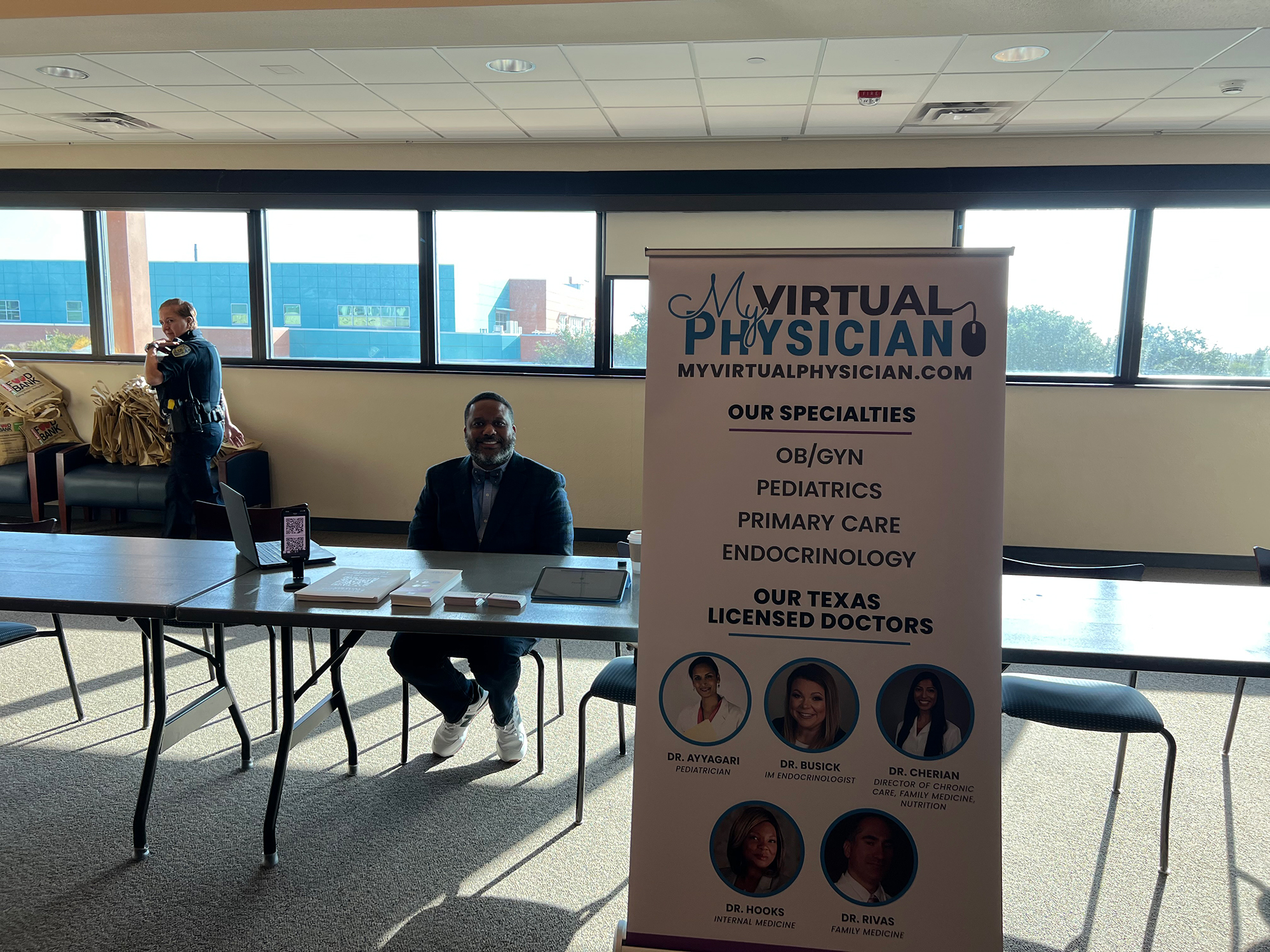
A new test to detect preeclampsia was just approved by the FDA Read on to learn more about why this is a big deal!
Historically, the United States has more pregnancy-related deaths than other developed nations. And over the last two decades, that number has continued to rise—more than doubling since 1999.
According to the Centers for Disease Control (CDC), there are approximately 17.4 maternal deaths per 100,000 live births, with causes ranging from heart complications like hypertension and preeclampsia to blood loss and post-surgical infections.
Preeclampsia is a pregnancy-related complication seen after 20 weeks of pregnancy. If a woman has preeclampsia during pregnancy, it usually shows up as high blood pressure (hypertension) and the presence of proteins in the urine.
This life-threatening condition puts both mom and baby at risk. For a pregnant mother, high blood pressure increases the risk of seizures and strokes that can cause permanent brain damage and may lead to death. For babies, this condition increases the possibility of placental abruption or preterm delivery, each coming with its own set of risks.
In the US, 1 in every 25 pregnancies results in a preeclampsia diagnosis–a shocking statistic that continues to increase.
Preeclampsia is diagnosed in pregnant women after 20 weeks gestation who present with hypertension along with at least one of these symptoms:
Regular blood pressure checks during routine prenatal visits is the first step to identify preeclampsia. Women with elevated blood pressure will be monitored more closely to determine individual risk level and treatment options.
When hypertension becomes a complication in pregnancy, doctors often order additional blood or urine tests to check for proteins, platelet counts, and other indicators of abnormal organ function.
Preeclampsia is a serious, life-threatening complication. Since preeclampsia is a pregnancy-related condition, the primary treatment option is to deliver the baby.
However, if the pregnancy is very preterm, early delivery can pose risks to the baby. Treatment plans might include close observation along with symptomatic treatment for preeclampsia to allow the pregnancy to continue.
The common theme with preeclampsia is that it’s not a very specific condition. While high blood pressure is a hallmark symptom, not all hypertensive pregnant women have preeclampsia. Other symptoms include headaches and dizziness, which are also non-specific symptoms of other conditions, including a healthy pregnancy.
Currently, less than 50% of severe preeclampsia cases are identified through traditional testing. For those patients with severe high blood pressure, the urine protein test can increase those odds up to 80%–but that still leaves a pretty big gap.
It’s often up to the keen eye of a watchful doctor and the self-reporting of the patient to raise the warning flag and warrant a closer investigation. However, a new blood test from Thermo-Fisher Scientific is helping provide a clearer picture with an astounding 94% accuracy rate.
A biomarker, or biological marker, is a general label for any biological attribute that can be identified and measured in a biological test of blood, urine, or other specimens. Most often, this is the presence or absence of a substance in the genetic material that indicates normal or abnormal biological function.
This test, specifically, measures a number of placenta-related proteins in the blood, providing results in a ratio format. This test is not a replacement for conventional testing but rather a supplement that helps doctors analyze risk levels for an individual patient.
The Food & Drug Administration (FDA) has recently approved this blood test after seeing accurate results from a study of more than 700 patients in 18 separate hospitals. The test can effectively predict the onset of preeclampsia in high-risk patients within a two-week window.
This means the test can help doctors decide when it is safe to discharge pregnant patients hospitalized with hypertension–giving them a reliable tool to know who is safe to go home. This new blood test for preeclampsia is expected to have a positive impact, helping to reduce the maternal mortality rate in the United States.
The new preeclampsia blood test from Thermo-Fisher is a big step in the right direction for reducing the number of deaths from pregnancy-related complications. Many of these deaths result from cardiovascular stress, like pregnancy-induced hypertension. This test now helps doctors be proactive and identify patients who are most at risk of developing the condition.
My Virtual Physician wants to help those affected by the recent tragedy in Mississippi.
Our hearts go out to the victims, families, and those affected by the tragic tornadoes in the state. We would like to extend a hand in any way we can by immediately helping increase access to affordable healthcare for those affected by the devastating tornado.
My Virtual Physician is an online healthcare provider with the ability to serve patients across all 50 states. We already have the framework in place to assist patients from across the United States, including Mississippi. Our caring and compassionate virtual doctors are here to meet the medical need in this time of crisis. Our diverse group of board-certified physicians are trained in multiple areas to address a wide range of health conditions.
Our specialists include:
As an established online provider, we’d like to offer our services to those suffering as a result of the tornado by providing round-the-clock medical support to supplement local providers. If you or a loved one has been affected and want the opportunity to be seen by a virtual doctor, My Virtual Physician is here to help.
Our practice is in-network with Mississippi Medicaid. For those without insurance coverage, My Virtual Physician will offer no-cost healthcare to residents who are affected by the tornado over the next 30 days.
Call (888) 224-0804 or schedule an appointment below to get care now. If you wish to take advantage of the free care as a Mississippi resident, be sure to note such in your scheduling details.
In a 21st century world of convenience, we’ve already got the ability to visit with doctors from the comfort of our own homes through telemedicine and virtual visits. But there’s another post-pandemic trend on the verge of emergence in the way that we visit the doctor. Mobile clinics are on the rise.
They’ve already been around for a few decades, but thanks to recently passed legislation—mobile healthcare clinics are about to get an overhaul and become a lot more commonplace, picking up 40% growth since 2019.
Find out what the new law is and how it is slated to impact your healthcare in a great big way!
The MOBILE Health Care Act is a new law (passed in 2022) that makes it easier for Medicaid healthcare providers to use federal funding to purchase and operate mobile clinics. The law was created in order to cut some red tape that previously required a brick-and-mortar facility in the region before federal funding could be used for mobile units. By eliminating the physical location requirement, it’s anticipated to expand healthcare access to harder-to-reach areas like rural communities.
Everyone can benefit from the new law. However, it’s especially exciting for rural communities that have limited options for healthcare. Other groups that will likely experience better access to healthcare include:
It’s important to note that low-income families who depend on Medicaid to pay for medical expenses are often limited by choice. Combining the monetary limitations of only having a small selection of doctors who accept Medicaid with the physical boundaries of rural areas can drastically reduce access to healthcare in these regions. Mobile clinics offer an opportunity to reach more Medicaid patients where they live and work.
My Virtual Physician is excited about the future of healthcare and how the new MOBILE Health Care Act can increase access to patients even further than telemedicine alone. We see a future where these mobile healthcare vans provide easy and convenient access to specialists to all patients—regardless of location, income level, or other circumstances. We understand there are inherent hurdles to overcome with patient access to telemedicine, and we embrace the future of merging telemedicine with mobile healthcare when and where it’s appropriate.
By combining telemedicine services with mobile clinics, patients will be granted access to hundreds of doctors rather than just the ones who are physically aboard the van. Today, technology and new legislation is letting doctors shift to meeting patients more effectively where they’re at rather than the other way around.
The MOBILE Health Care Act takes the future of healthcare a step in the right direction.

There’s been a recent spike in positive RSV tests in the Las Vegas region. CDC data shows a jump to over 5% of positive PCR tests that began in September and October.
This spike resembles last year’s Vegas RSV data for September, but preliminary information looks like it might be doubling October’s numbers. So is it cause for concern?
Here’s everything you need to know about RSV if you’re living or staying in Las Vegas.
Respiratory syncytial virus (RSV) is a seasonal respiratory virus that resembles the common cold, but can develop into a more serious illness for some people.
Each year, this virus spikes during cold weather months, typically late fall. This cycle, the CDC surveillance noticed that the peak is happening earlier than usual across the country, and hospitals are seeing more patients coming in with RSV.
The symptoms of RSV appear within a week after exposure, and they can include a series of effects lasting one to two weeks, such as:
For infants under one year old, the symptoms can be difficult to identify and can include the following:
For most people, the RSV virus is not dangerous. The immune system naturally takes care of the virus with a one-to-two-week recovery period. Some populations are at a higher risk (babies under the age of one) of developing serious complications, including:
RSV is so common that most children contract and recover from RSV before turning two years old. Having RSV isn’t necessarily a cause for concern—but keep a close eye on the more troubling symptoms involving difficulty breathing and look for signs of dehydration.
Infants, the elderly, and those with compromised immune systems or existing breathing problems are at a higher risk when it comes to RSV. Their bodies may struggle more than others to heal from the virus and may require medical intervention.
Here’s a list of specific factors that may also put you or your loved ones at a higher risk of RSV-related complications:
If you or someone in your family is at a higher risk of complications from RSV, then follow the precautions in the next section to reduce your chances of exposure. If you have a trip planned to Vegas with your infant, you may want to reschedule until your baby is older and the spike in RSV has passed for the season.
Follow these tips to help reduce the spread of RSV in Las Vegas and elsewhere:
If you believe you or your child has RSV, stay home for at least one week after symptoms begin. Schools and daycares tend to spread RSV. People with cold or flu-like symptoms should avoid contact with those who are at a higher risk of complications from RSV until they have recovered.
RSV testing is available. There are several types of tests that can be used to diagnose the viral infection. Testing is recommended for more vulnerable populations with symptoms who are at a higher risk of developing severe respiratory infections from the virus.
The testing process varies but one method is very similar to Covid-19 testing; using a nasal swab. Another method requires flushing the nose with saline liquid to collect the sample for lab testing.
In most cases, RSV clears up on its own, and no medical intervention is required. There are not currently any vaccines or medications that are used for recovering from RSV.
Here are some natural remedies that help to relieve the symptoms:
If you need help treating the symptoms and over-the-counter medications are not helping, or you’re not sure about giving your child cold medicine, contact your doctor or pediatrician.
In rare cases, infants or older adults may require treatment in a hospital setting for a few days so that they can get oxygen or IV fluids to help with breathing and hydration while the body recovers. Out of 100 infants under six months old who test positive for RSV, only one or two will require hospitalization.
RSV is a common virus that comes around every year and doesn’t pose much of a problem for most people. However, for some, it can become life-threatening. If you or someone in your family is at a higher risk for RSV-related complications and you’re concerned, there are steps you can take to minimize your exposure.
If you’re having symptoms and would like to get tested for RSV because you or someone you are around frequently is at a high risk for complications, contact My Virtual Physician to set up RSV testing or get medical advice to treat symptoms.
Book Appointment Now Call For An Appointment
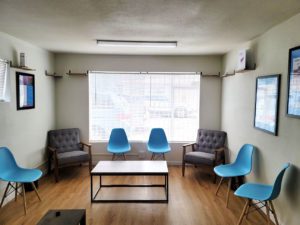
My Virtual Physician has an exciting announcement to celebrate: our hybrid clinic on Paradise Road is now open in Las Vegas!
My Virtual Physician’s mission is to provide safe, secure, and convenient access to healthcare for men, women, and children. In other words, we use telemedicine to fill the healthcare access gap that’s left by the reality that many doctors don’t offer same-day services. Patients who need to see a doctor now have the ability to meet virtually with our team of physicians with same-day appointments.
Our online telemedicine services launched during the pandemic, have grown exponentially, and continue strong today—providing quality healthcare access nationwide, online. We credit our growing team of doctors for our success.
But My Virtual Physician aims higher than simply providing online access to those who have the right equipment for a virtual visit (such as a smartphone or computer equipped with a camera and mic).
Other limitations exist with providing this type of healthcare solely online, including not having a private or safe place to interact virtually and the lack of medical equipment for taking vitals and collecting labs for diagnostics.
To overcome this challenge, My Virtual Physician opened its first one-of-a-kind hybrid clinic in Las Vegas. We’re excited to announce that, despite some major obstacles, we have successfully launched our first physical walk-in location.
Related: Hybrid Medical Clinics: Expanding OBGYN Access in Las Vegas
My Virtual Physician’s hybrid medical clinic is now open at 2217 Paradise Road in Las Vegas. Walk-ins are welcome. Find out our current hours or book an appointment (if preferred) here.
We are pleased to welcome men, women, and children into the physical clinic for a virtual visit in our private patient room, where our videoconferencing equipment is already set up and ready to go. We provide women’s health, pediatric, and primary care services in our hybrid clinic.
My Virtual Physician is proud to have opened the first clinic in Vegas that offers immediate access to online healthcare for those who may not have access to the equipment or private space. We welcome all to come visit us. Find us on Paradise Road! Get Directions Here.
Related: Now Available: Walk-in STD Testing in Las Vegas at Hybrid Clinic
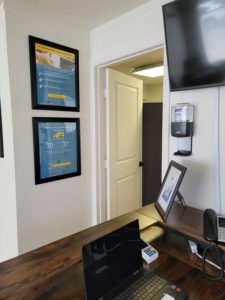 Inside Our Las Vegas Hybrid Clinic
Inside Our Las Vegas Hybrid ClinicTake a peek inside our clinic, where our certified medical assistant (CMA) will greet you! We have a comfortable waiting room for busier times. We also have a private room for patient use where our CMA will take your vitals, give you the tools to collect samples if needed for labs, and then you can meet virtually with our doctors with our private and secure videoconferencing setup.
At times, we do staff the clinic with a nurse manager and other medical professionals who can provide additional services such as wound care, vaccinations, ultrasounds, and more. If you’re interested in these services, please call ahead to (888) 224-0804 so that we can make sure the appropriate staff is present for your visit.
My Virtual Physician offers affordable and immediate access to patients at our new hybrid clinic in Las Vegas. Click to find out more about which services we offer. Welcome to our clinic!

Are you looking for a doctor who accepts Medicaid in Las Vegas? Nearly a million citizens are currently enrolled in Nevada’s Medicaid and CHIP program. It can be challenging to find a provider that accepts Medicaid. Luckily, My Virtual Physician is approved to accept Medicaid as payment for medical services, including doctor’s appointments. Patients can visit online or connect virtually with doctors at our physical hybrid location in Las Vegas, located at 2217 Paradise Road. Read more below to find out how to see a Medicaid doctor in our Las Vegas clinic (or online).
My Virtual Physician has a new physical location on Paradise Road in Las Vegas. At this hybrid location, patients looking for a Medicaid doctor in Vegas can have their vitals taken, get lab samples taken, and connect virtually with a doctor in a private room through our videoconferencing setup.
Whether you just need to get a quick covid test, physical exam, or get a prescription refill, our hybrid clinic in Las Vegas is set up to handle your basic medical needs. We have primary care physicians as well as specialists on staff to meet with you today. Our Nevada specialists include:
Read more about our doctors and which states they are licensed to practice in.
Check the clinic’s current hours here before you visit. As you walk into our clinic, our medical assistant will make you comfortable and take your vital signs for the doctor’s review. You’ll be guided to a private room to meet virtually with one of our doctors via our secure videoconferencing setup. Upon leaving, if you were prescribed any medications, you can either head to the pharmacy or head home to wait on your order-by-mail prescription. We cater to meet patient needs, so just let us know which pharmacy option you prefer during your visit.
If you prefer to schedule an appointment time rather than wait during a walk-in visit, My Virtual Physician welcomes you to reserve an appointment time by filling out the form on this page.
You have options to either book an appointment for a virtual visit on your own equipment (smartphone or computer) from any location in the state or at our physical hybrid location at 2217 Paradise Road in Nevada. Both ways to see your doctor are covered by Medicaid.
If you schedule an appointment time at our hybrid clinic in Las Vegas, your experience will be similar to the walk-in option above. Our medical assistant will welcome you, collect any samples and vitals as needed, and show you to a secure room where you’ll visit privately online with one of our doctors.
A third way to see a Medicaid doctor in Las Vegas is through online appointments. While you’ll need to be a resident of Nevada for the visit to be covered by Nevada Medicaid, you may still be covered by your state’s Medicaid plan in other regions. Check our coverage map and payment page to see if your state’s Medicaid plan is included in our coverage area.
Currently, other states with Medicaid coverage with My Virtual Physician include: Arizona, Colorado, Tennessee, and New York.
To schedule your online appointment today, click below.
Book Appointment Now Call For An Appointment
Regardless of which part of the state you’re located in, if you prefer not to physically travel to our hybrid clinic, you don’t have to. If you have a smartphone or computer that can record video and sound, then you can meet with our Medicaid doctors through a telemedicine visit online.
The process works as easily as this:
Today, getting medical care is simple and easy. You can quickly find doctors in Las Vegas who take Medicaid. And care is available through a variety of channels, including in-person, hybrid clinics, or 100% virtually. My Virtual Physician is here to help make healthcare more accessible to those who need it, including those who have Medicaid.
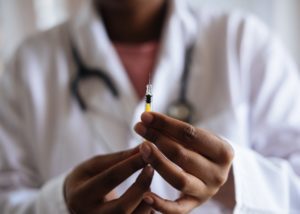
As the number of monkeypox cases climbs in the United States during the 2022 outbreak, people are wondering if they should get the vaccine.
Data from today shows nearly 30,000 cases in the US, making up nearly half of the cases in the entire world (just over 75,000 total cases worldwide) this year. Although it’s not very deadly, it’s also not pleasant. So, what can you do to reduce your risk of contracting the monkeypox virus? One option is the monkeypox vaccination.
That brings us to our big announcement: we’re proud to announce that My Virtual Physician is in the process of becoming certified to dispense the monkeypox vaccine inside our Las Vegas Hybrid clinic located at 2217 Paradise Road.
Related: What is Monkeypox and How Can I Get Tested?
Monkeypox is closely related to the smallpox virus, and there are two vaccines that are currently used to prevent monkeypox and smallpox. They are called JYNNEOS and ACAM2000. It’s important to note that certain groups should not get the ACAM2000 version, including:
The JYNNEOS vaccine is provided in a series of two doses, spaced 28 days apart. The injection site can be located in your forearm, shoulder blade, or shoulder muscle. The vaccine is considered effective 14 days after the second dose is received.
ACAM2000 is the alternate monkeypox vaccine, provided in a single dose using a special needle that administers multiple pricks. The injection site will form a lesion that will take several weeks to heal and requires special after-care attention to prevent spreading the live Vaccinia virus to others. This vaccine has a longer period of time to be considered effective, at 28 days after vaccination.
Not everyone should get vaccinated for monkeypox. Right now, the CDC only encourages two major groups of people, who are at a higher risk, to consider vaccination. You should consider vaccination if:
Men who have sex with other men, transgender, and nonbinary people may also be at a higher risk of contracting monkeypox and should consider vaccination. Additionally, if you engage in sexual activity with multiple partners, you could also increase your chance of getting monkeypox.
Even if you’ve already been exposed, the CDC still recommends getting vaccinated as soon as possible to reduce the severity of symptoms.
If you’re not sure whether you should get vaccinated for monkeypox, contact our doctors at My Virtual Physician, and we’ll help you determine which course of action is right for your situation. If it’s deemed that you qualify for the vaccine, we’ll notify you when it is available at our hybrid clinic on Paradise Road in Las Vegas. Contact us today for more information about the monkeypox vaccine.
Book Appointment Now Call For An Appointment

When was your last STD test? It’s hard to keep up with the latest testing recommendations, let alone make sure you’re in line with them. My Virtual Physician wants to make it easier for patients to stay on top of regular STD screening and testing with our hybrid clinic, which now offers walk-in STD Testing in Las Vegas.
Our hybrid clinic is now open and located at 2217 Paradise Road in Las Vegas.
If you’re unsure about whether you’re due for STD testing or which test to get, continue reading below so we can fill you in on the details.
Not everyone needs to get screened or tested every year for STDs. But certain populations are at a higher risk of contracting particular STDs. There are different recommendations for men and women.
In general, get screened or tested at least annually if you are under 25 and sexually active, HIV positive, having symptoms, or have multiple sexual partners. Since many people do not experience any symptoms when they have an STD, it’s important to get tested regularly.
If you’re in this higher-risk group, visit our walk-in clinic in Las Vegas today to get a quick and simple STD test done today.
Even if you’re not in the high-risk group, you may be experiencing symptoms that you’d like to confirm are not a sexually transmitted infection. Here are signs to look out for if you suspect you might have symptoms of an STD:
Read more about specific STDs and when to get screened or tested in these blogs:
Related: The Importance of STD Screening with a Virtual Doctor
Chlamydia and gonorrhea are the two STDs most commonly tested on a yearly basis for higher-risk individuals, particularly women, since these infections can cause severe complications for the female reproductive anatomy if left untreated.
Rule out HIV at least once in your lifetime if you are sexually active and between the ages of 13 and 64 years old.
Other tests specifically recommended for pregnant women include:
Some clinics offer throat or rectal STD testing options if you suspect an oral or anal infection. Call your doctor to find the best testing facility if you need these areas tested.
If you want to get STD testing done today, visit our hybrid clinic located at 2217 Paradise Road. My Virtual Physician is proud to offer walk-in STD Testing in our Las Vegas location. Alternatively, if you’re outside of the Vegas area or prefer not to leave home, connect with our doctors online to find out how to get an at-home STD test kit sent to your home.
Book Appointment Now Call For An Appointment

Getting sick in Vegas is not fun! If you’re in the big city, whether on business, pleasure, or because you live here, you may be looking for a quick way to get tested to rule out Covid-19.
While the drive-through Covid testing sites have shut down, the government has suspended the free at-home test program, and testing requirements for Covid-19 have dropped off, My Virtual Physician aims to provide easy access to Covid testing for those who want to be checked.
With the recent opening of its Hybrid Clinic, located at 2217 Paradise Road in Las Vegas, you can now walk-in to get your Covid testing done right on the Vegas strip.
My Virtual Physician’s hybrid clinic in Las Vegas offers three Covid testing options for your choosing. We can do:
PCR tests are most accurate, but they should be avoided if you tested positive within 90 days since they can still detect prior viral genetic material for that length of time.
Antigen tests are not as reliable and may require multiple tests to confirm results. The CDC recommends repeating this test after 48 hours to ensure an accurate reading.
At-home tests can be purchased over the counter or picked up at our hybrid clinic in Las Vegas. These are antigen tests and can give you results in under 30 minutes from the comfort of your own home. These are ideal if you are picking the test up for someone who prefers to stay at home.
The CDC has updated the Covid-19 testing information and now recommends that you get tested if you have symptoms. Common Covid-19 symptoms include:
Before you visit someone who is at a high risk of severe Covid-19, such as the elderly or immunocompromised, get a Covid test.
If you’re looking to treat your covid-19 symptoms, My Virtual Physician can help with that as well. Our clinic doors are open if you’re in town and need to get tested and consult virtually with our doctors. Treatment must begin within a few days (five to seven days, depending on treatment) after you first have symptoms and is reserved for those who are at higher risk of becoming very sick. Treatment reduces your risk of hospitalization or death from Covid-19.
If you’re not eligible for Covid-19 treatment, our doctors can help you manage your symptoms with a care plan tailored to your experience. Check your eligibility by comparing your situation to the criteria below:
Our physicians can help determine whether you would benefit from Covid-19 treatment, and if so, prescribe the appropriate treatment. Come see us today at our Covid testing site in Las Vegas or schedule your appointment online to address your symptoms and get treatment after a positive at-home test result.
Book Appointment Now Call For An Appointment
The new year found Americans mired in the peak of yet another SARS-CoV-2 wave, with the preceding holiday season scarred by overstretched health care systems and testing capacity. In response, the Biden administration has increased the accessibility of at-home COVID-19 tests on multiple fronts.
In January 2022, all US households became eligible to request four free rapid COVID-19 tests either via the website, COVIDTests.gov, or by calling 800-232-0233.
At the same time, the government also mandated that private health insurers cover up to eight at-home antigen tests per month, per covered individual, with reimbursement capped at $12 per testing kit (two tests per kit). Out of pocket costs vary between ~$10-25 per kit. Typically, the insurance provider will cover the upfront cost for in-network pharmacies and retroactively reimburse members who buy test kits from out-of-network pharmacies.
Although Medicare was not initially included in the coverage mandate, at the beginning of February the Biden administration announced that Medicare beneficiaries, including Medicare Advantage, would also become eligible for eight free at-home COVID-19 antigen tests per month, beginning in the early spring.
The expanded coverage will include over 60 million Americans, many of whom fall into the higher risk health category.
Medicaid recipients already have full coverage of at-home COVID-19 tests (8 per month).
Many labs are experiencing long delays –5 days or more– in processing COVID-19 PCR tests.
If this is the case for you, and you are wondering what to do while awaiting your test, you can utilize serial at-home tests (typically rapid antigen tests), if you have access to them. These tests come back in ~ 15 minutes, but they are less sensitive for testing small amounts of the virus and will be negative very early on in the infection. One approach might be to begin testing with antigen tests on day 3 (day 0 is your exposure), then test daily while awaiting the PCR result.
If you are asymptomatic, never develop symptoms, and antigen tests remain negative 5 days apart (eg day 3 and day 8), it is unlikely you have COVID-19.
If you have or develop symptoms of COVID-19, and you are not able to obtain antigen tests OR even if the initial antigen test was negative, assume you likely have COVID-19 and isolate accordingly.
The table below is a basic outline of recommendations regarding what to do while awaiting your PCR test (for a more detailed explanation, including definitions of quarantine vs isolation: https://myvirtualphysician.com/2022/01/22/ive-been-exposed-to-covid-19-what-now/)
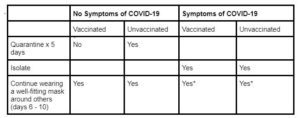
*Continue isolating as long as you are experiencing symptoms of COVID-19 and while awaiting test results. You can end isolation after 5 full days if your symptoms are improving AND you are fever-free for 24 hours (without taking any fever-reducing medications), provided your other symptoms have improved.
* Please contact your medical provider if you test positive for COVID-19 and/or if you are experiencing any severe symptoms of COVID-19.
If you haven't yet been in the situation where you've received 'the call', the one in which someone you were recently in close contact with rings you a day or two later to let you know they tested positive for COVID-19 (these days, this means positive for the highly transmissible Omicron variant), it’s highly likely that you may be in the coming weeks. Both Dr. Janet Woodcock, acting head of the FDA, and Dr. Anthony Fauci, President Biden's chief medical adviser, stated recently that they expect the majority of Americans will eventually be infected with COVID-19. Mercifully, Omicron infection appears to cause less severe disease than previous variants and a large swath of the population has a degree of protective immunity, either through vaccination and/or a previous infection.
The CDC has recently updated its recommendations for quarantine following COVID-19 exposure. To briefly summarize, if you've just found out you had an exposure and you are not experiencing any symptoms (asymptomatic):
- Stay calm. It takes time for the virus to reach detectable levels. The CDC recommends testing on Day 5 (Day 0 is the day of exposure). Testing experts have noted that Omicron tends to replicate more quickly, though, and suggest that–if possible–at-home testing can begin on day three, and continue daily through day seven.
- If you are fully vaccinated and boosted, then you do not need to quarantine (again, if asymptomatic). However, it is recommended to wear a well-fitting mask, such as an N95 or KN95, for 10 days when you are around other people.
- If you are unvaccinated or vaccinated but did not receive a booster, quarantine for 5 days. If you are asymptomatic, you can stop quarantining but should continue to wear a well-fitting mask such as an N95 or KN95 around others for 5 more days.
If you develop symptoms of COVID-19 AND/OR receive a positive test, isolate for at least 5 days if you have confirmed or suspected COVID-19, regardless of vaccination status. Day 0 is counted as either the first day of symptoms or, for those without symptoms, the date of an initial positive COVID-19 test. Isolation means you stay home, separate yourself from others in your household, and – if necessary to be around them -- wear a well-fitting mask at all times. If you had COVID-19 and had symptoms, you can end isolation after 5 full days if you are fever-free for 24 hours (without taking any fever-reducing medications), provided your other symptoms have improved. If you tested positive for COVID-19 but never developed symptoms, you can end isolation after 5 full days. In all cases, you should continue wearing a well-fitting mask around others for 10 days (days 6 - 10).
Serial Testing: If you want to take a test at the end of the 5-day isolation period, it is best to use an antigen test (the more sensitive PCR test can detect very low levels of virus and will often stay positive for weeks after infection). If the test result is negative, as above, end isolation and continue mask-wearing through day 10. If the test result is positive, you should continue isolating until day 10. If you continue to test positive on an antigen test after day 10, the safest route is to continue isolation until you have a negative test result. For many people, this may not be feasible; if this is the case, experts recommend continuing to wear a highly effective mask, such as an N95 or KN95, around others, and being mindful of your contacts (eg avoid public transportation and situations where immunocompromised persons may be present).
* Please check in with your health care provider for concerning symptoms or test results
|